Wellness Wednesday: The Big Deal About a Swimmer’s Nutrition: What to Know
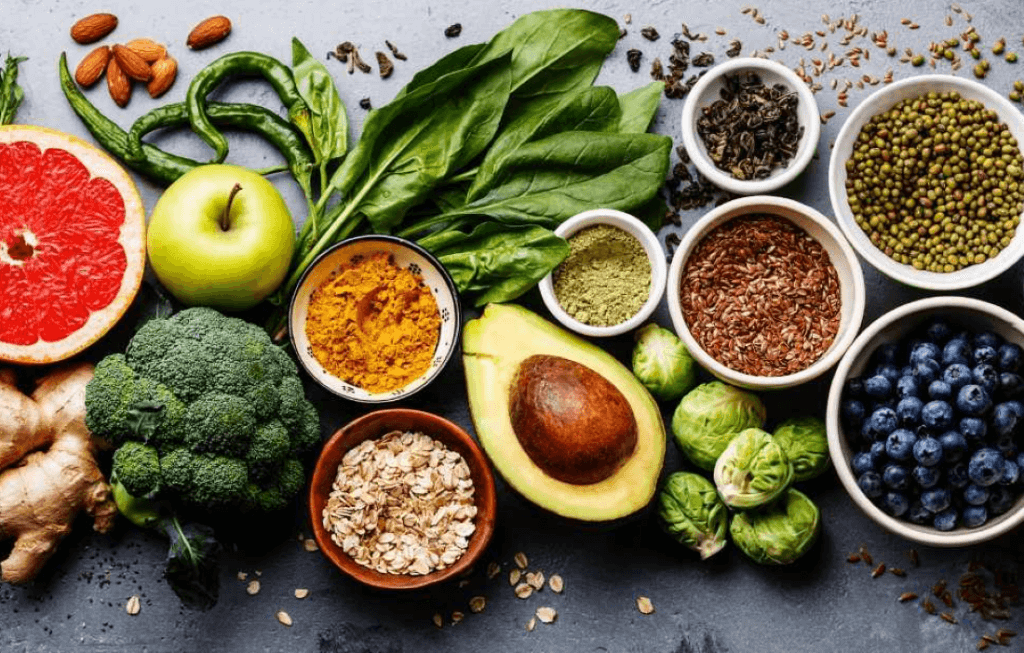
The Big Deal About a Swimmer’s Nutrition
By Bailey Duran
Swimming requires massive amounts of energy, whether it’s an elite-level practice or an age group practice. Because of this high energy expenditure, swimmers need to take the right steps to replenish the nutrients lost.
According to wellness coordinator Brigette Peterson‘s research in sports nutrition, competitive swimmers can burn up to 5,000 calories in four hours, depending on the intensity of the workout. Thus, swimmers can burn approximately 40 percent of their daily energy during this time. Because of this incredible energy expenditure, proper nutrition is essential to rebuilding and recovering.
Peterson says, “Nutrition is cornerstone of every athlete’s performance, but especially a swimmer’s.”
Detrimental Nutrition Mindsets
Two common detrimental mindsets that swimmers have regarding meals fall on opposite ends of the spectrum.
The first is, “I swim hard every day so I can eat whatever I want. I’m working it off when I swim.” While it may be true that you are burning a lot of calories, you aren’t refueling with the necessary nutrients that will keep you healthy and swimming fast. Not to mention that eating loads of sugar and other processed foods will hinder your swimming and make you feel sluggish and slow.
The other mindset is: “I worked super hard in practice, so I don’t want to ruin it by eating too much. I won’t eat or will eat much less than what I probably should.” You can’t expect your body to be able to put maximum effort into a practice or a race if it doesn’t have enough fuel to do so.
It doesn’t matter how much or how hard you swim or train, you will not reach your potential without proper nutrition.
What Should Swimmers Eat?

Photo Courtesy: Joey Soraghan
You may be asking, “Well then, what should I eat?”
According to natural health and fitness expert Brue Baker, swimmers who are training intensely for more than two hours daily should eat four to seven light meals a day. Eating large meals or too much in one sitting will leave the swimmer feeling lethargic and will inhibit your performance (The Importance of a Swimmer’s Nutrition). It should also consist of foods that are easy to digest.
Carbohydrates should make up one half of a swimmer’s diet as it is the fuel swimmers need to get through that tough practice or meet. Carbs are stored as glycogen in the muscles and liver and is the fuel that our body uses throughout our day – especially during a workout. After the workout, that energy source will be running low and will need to be replaced. Some good sources of carbs are rice, cereal, pasta, potatoes, beans, peas, and lentils.
The other half of a swimmer’s meal should consist of protein, healthy fats (olive oil, nuts, avocados, and seeds), vegetables, fruit, whole grains, vitamins, and minerals.
According to the Academy of Nutrition and Dietetics, 0.5 to 0.7 grams of carbohydrates should be consumed for every pound of body weight. For someone who is 150 pounds, this adds up to about 75 grams. This should be coupled with 20 to 40 grams of protein.
Protein repairs and rebuilds the muscles after the stresses of training in addition to warding off soreness. The building blocks of proteins are amino acids, which are the main components of muscular growth and repair. Diana Goodwin of Aquamobile tells us that protein also supports and boosts the immune system as well as quenches those annoying hunger pangs that plague swimmers during practice. Some sources of protein are lean meats, fish, eggs, and low-fat dairy.
Swimmers should also drink water often to stay hydrated, sipping on their water bottles throughout the day to replenish sweat loss (yes, it is possible to sweat in the water). Many athletes don’t think about replacing electrolytes and other minerals lost in sweat, most notably sodium and potassium. While most athletes consume enough sodium in a normal diet, you can sprinkle some salt and glucose to your beverage for absorption and replenishment.
Peterson says, “A properly fueled body will result in better performance during practice and competition. Nutrition is everything.”
What to Eat the Day Before a Meet
The day before the meet, the swimmer should eat foods that are high in complex carbs and drink fluids often.
Swim England Masters advises to “eat little and often—every two to four hours to keep blood sugar levels steady and fuel muscles.” Stick to foods that you are familiar with and avoid big meals. Do not overeat – you’ll feel lethargic on race day!
Foods with Complex Carbs:
• Oatmeal
• Brown rice
• Sweet potatoes or white potatoes with skin
• 100% whole wheat bread and pasta
• Grapefruit
• Apples
• Bananas
• Blueberries
• Cantaloupe
What to Eat for Breakfast Before Practice or Meet
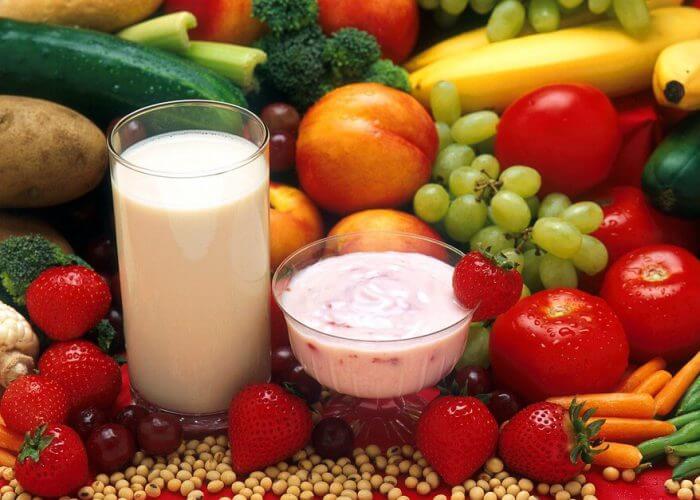
Photo Courtesy: Maxpixel
Even if you feel too tired or nervous to eat, you need to eat – even if it’s just a little bit.
Eating breakfast kick-starts your metabolism and helps your body prepare for what is to come while helping maximize performance and training.
Eat something light and easily digestible such as cereal, oatmeal, banana, toast, fresh fruit or yogurt. If you really lack appetite in the morning, Sport Dietitians of Australia recommends drinking a liquid meal, such as milk tetra packs or smoothies.
What to Eat Before a Practice or Meet
The swimmer should eat a high-carb meal two to four hours prior to a practice or meet. The meal should be low in fiber and fat. Examples are whole grain cereal with milk, fresh fruit or oatmeal with banana or cinnamon.
One to two hours before, the swimmer should follow up with a light snack such as fresh fruit or a sports bar.
What to Eat During a Meet
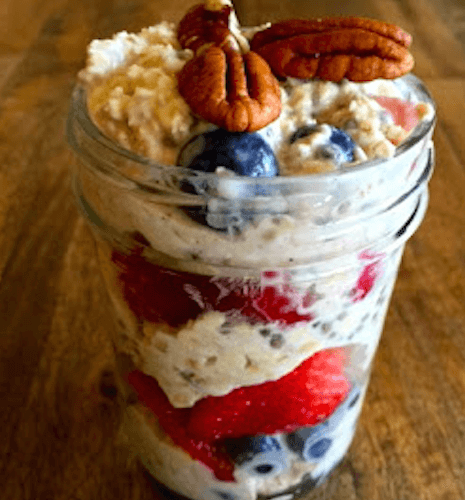
Photo Courtesy: Tasija Karosas
The swimmer should make sure to eat and drink between events to aid in recovery and to ward off dehydration.
If the swimmer has less than one hour between events, the snack should be light and easy to digest. Sport Dietitians of Australia recommends juice, yogurt pouches and small pieces of fresh fruit.
If the swimmer has more than one to two hours between races, they can fuel with the following: pasta, sandwiches (whole grain or whole wheat bread and organic meat) or sushi.
Bring a cooler of food so you are ready to re-fuel!
Snacks to Eat Between Races
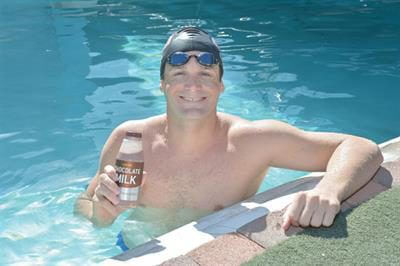
Photo Courtesy: Ben Fischer
After a race or practice, the swimmer needs to eat as soon as possible for recovery. Snacks should consist of complex carbs and proteins, not simple sugars or foods high in fat. Foods such as pasta salad, plain sandwich, bananas, grapes, apples, dried fruit (raisins, craisins, apricots, mango), cereal bars, yogurt and unsalted nuts are perfect for this.
If you can’t do solids between your races, try diluted juice with a pinch of salt, chocolate milk or a smoothie.
What to Eat After Meets and Practice
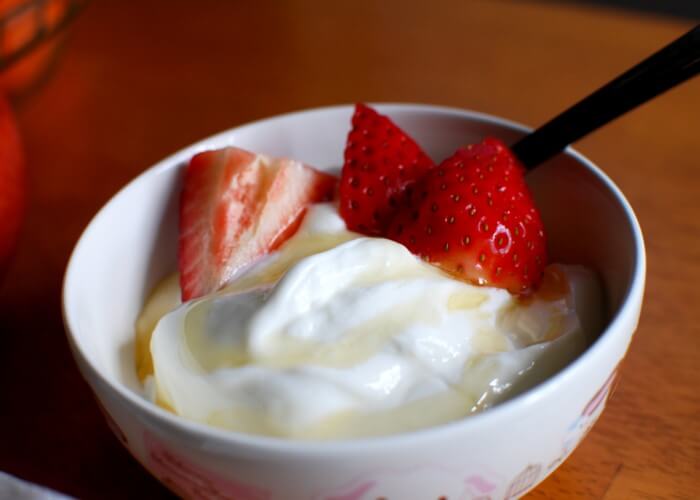
Photo Courtesy: Janine, Flickr
Foods eaten after practice or a meet should contain carbs for fuel and protein for muscular repair and growth. The swimmer should also drink water to stay hydrated.
Carbs: fruit smoothies, yogurt fruit cup, fresh fruit or toast and jelly (or peanut butter with bananas).
Proteins: whole wheat pita and hummus, white meat sandwich, chocolate milk (protein and calcium to strengthen bones and feeds amino acids in the muscles), tuna salad, eggs, nuts, edamame, smoothie with dairy and omelets or fried eggs on toast.
In conclusion, perhaps Baker sums it up the best:
Swimmers – it is time to stop leaving your nutrition floating in the pool. I guarantee you that if you continue to train and implement the above swimmer’s nutrition recommendations into your diet, you will be able to swim faster and longer because of it. Don’t take your swimming nutrition for granted, it is just as important as your hours in the pool.
An easy and delicious swimmer smoothie recipe:
Peach Raspberry Gold Medal Smoothie
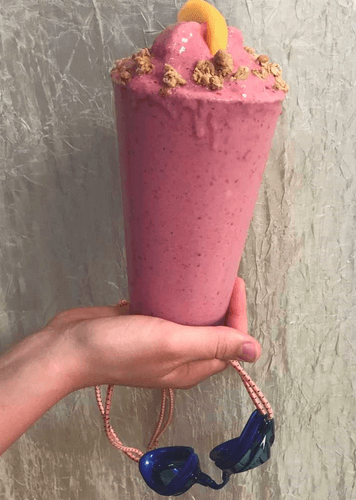
Photo Courtesy: Bailey Duran
Recipe by Victoria Duran, 15-year-old swimmer
• ½ bag of frozen peaches
• ½ bag of frozen raspberries
• 5 ice cubes
• ½ cup of vanilla Chobani non-fat Greek yogurt
• ½ avocado
• 1 scoop of whey vanilla protein powder
• ¼ cup of chopped almonds
• ¼ cup of agave nectar
• ½ cup almond milk
Blend until smooth.
Add more almond milk if needed.
For more information about foods that are in each category of the essentials for swimmers, click here.
Commentary: All nutritional research was conducted by the author and does not necessarily reflect the views of Swimming World Magazine nor its staff.




Giovani Villaseñor
Lindsey
Becky Sue Lindberg
Junior Diaz
Abby Dudash read the entire article!
Erini Pappas
Ian MacLaren
Tonya Duran Yates
Tristan Hollard
Dominic Redpath
Cindy Hoeft
Great article!!
Tory Phillips have a read
Ruth Tompkins Wiley. Some good suggestions.
Chris Rudel
Colin Gilbert
Agreed – our 11-year-old swimmer used to be incredibly hungry all day until we started snacks every 2 hours with breakfast, lunch and proper dinners. We follow an old school philosophy of yellow, green, white and protein on the plate. Not only is she not hungry all day, but do not crave anything sweet at any point in time. I would just add honey to the list due to the amino acids and all the nutrients. We also find that the honey helps with her overall health as an asthmatic. Note that it does not work if you just start using honey on a race-day. We use honey all the time even before training – sometimes we swop a spoon full of honey for peanut butter in between races. Other swimmers think we are nuts but it works very well for us.
Pinóquio ? Pinóquio ? Pinóquio ?
Benjamin
Gustavo Garcia
Becky Sue Lindberg #freetheranch
You and Ryan sent me the same article #theranchisalwaysfree
Cary Runnells
Kira Zubar
The healthiest diet for all athletes including swimmers is a plant based Whole Foods. This means do NOT eat animal products and processed oils; no eggs, no dairy, no cheese, no meat including chicken or fish. Get your good oils from walnuts, almonds, seeds, NOT olive oil or other processed oil. Eat plants only especially green leafy cruciferous veggies which are the highest in nutrient density. Jon Rosenbaum
Not everyones vegan
Jon I understand where you are coming from in terms of the benefits of more plants in diets, but there are issues with that approach too. For some people who are trying to gain or maintain weight for instance there isn’t enough calorie density in a 100% vegan diet -unless you have a tremendous appetite. This is due to the fiber content. Younger swimmers who are burning ~1200 calories in practice daily find it hard to get the calories they need. If they are doing doubles then it’s nearly impossible on a vegan diet without supplementation.
Agreed. I found it odd in reading the diet above that no vegetables were mentioned.
This certainly not the healthiest. My child would disappear. Protein is important and very hard to achieve on a vegan diet without supplements. I rather my child eat real natural food over manufactured/processed food just to be vegan.
This is really so benefiting thank you for this effort
amazing food works to perfection
hi